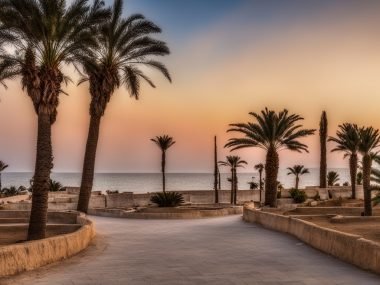Have you ever thought about why Tunisia does not use Daylight Saving Time (DST)? This country, a North African gem, follows Central European Time (CET) only. They stopped using DST after the last change on October 26, 2008. Since then, there has been no move to start DST again in 2024.
Let’s look back at Tunisia’s timekeeping history. They used DST now and then, starting from 1939 to 1945. Then, they tried it again from 2006 to 2008. So, what does this mean for Tunisia and its people today? Not using DST affects their schedules and dealings with other countries in business and travel.
Key Takeaways
- Tunisia, known officially as the Republic of Tunisia, operates within Central European Time (CET).
- The country stopped observing Daylight Saving Time (DST) after October 26, 2008.
- There are no intentions to observe DST in 2024, maintaining a constant time zone.
- Historical use of DST in Tunisia was noted between 1939-1945, 1977-1990, and 2006-2008.
- This affects planning for international business, travel, and communication with Tunisia.
Understanding Daylight Saving Time (DST)
Daylight Saving Time (DST) is when we set clocks forward by an hour in the warm months. This helps us use more sunlight and save on electric lights. Let’s learn more about Daylight Saving Time and its benefits.

What is Daylight Saving Time?
DST means Daylight Savings Time. In the spring, we turn clocks an hour ahead. And in autumn, we turn them back. This gives us more light in the evening for fun activities. But, Tunisia isn’t doing DST this year.
Why Do Countries Observe DST?
Countries use DST for many good reasons. It brings benefits like:
- Using daylight better
- Using less energy
- Fewer car accidents because it’s lighter
- More time for fun after work
Tunisia used to do Daylight Savings Time. Now, they keep the same time all year. They follow the IANA time zone for Africa/Tunis, without changing for DST. This is different from before when they changed the clock.
Current Time Zone in Tunisia
Tunisia is in the Central European Time (CET) zone. It is UTC+01:00 ahead. This system started on April 12, 1911. It helps keep the country’s time uniform. With CET, Tunisia does not change its clocks for Tunisia time adjustment. Before, Tunisia used Tunisia summer time. But now, it follows CET all year.

Before, Tunisia changed its clocks for Tunisia summer time. Now, there’s no need for shifts. This makes timekeeping simpler. Without changing for Daylight Saving Time (DST), life is easier. Tunisia aligns with countries in the Central European Time zone. This helps with international meetings and work.
Historical Background of DST in Tunisia
Tunisia has an interesting history with Daylight Saving Time (DST). Over the years, the country tried DST, then stopped it.
Early Adoption of DST (1939-1945)
Tunisia first tried DST during World War II, from 1939 to 1945. It was to save energy and use more daylight. They moved clocks forward by one hour.
Intermittent Observations (1977-1990)
Years later, Tunisia gave DST another try. This was on and off between 1977, 1978, and then from 1988 to 1990. The goal was the same: save energy and make the most of daylight.
Final Observations (2006-2008)
The last try at DST was from 2006 to 2008. The aim was to use daylight better. But since 2008, Tunisia stopped DST. Now, the time stays the same year-round.
Does Tunisia Have Daylight Savings Time?
Since the last clock change on October 26, 2008, Tunisia no longer follows Daylight Saving Time (DST). The country sticks to Central European Time all year. This makes schedules simple for people and businesses. It helps with planning activities like business, travel, and talking with others.
Does Tunisia Have Daylight Savings Time is still a key question for many. Not changing the clocks avoids mix-ups over time. This is good for travelers and businesses.
Here is a simple look at how Tunisia manages time now:
| Aspect | Current Practice | Previous DST Periods |
|---|---|---|
| Time Zone | Central European Time (UTC+01:00) | Central European Summer Time (CEST) |
| Clock Adjustments | No adjustments | Advanced by 1 hour |
| Years of DST Practice | None | 1939-1945, 1977-1990, 2006-2008 |
| Impact on Planning | Consistency all year round | Potential season-based confusion |
No more Tunisia clock change for Daylight Saving Time Tunisia since 2008 means stable planning for all.
Impact of Not Observing DST on Daily Life
Stopping Daylight Saving Time (DST) in Tunisia changed daily life in many ways. Businesses, especially those working internationally, must remember there are no time changes. This makes planning easier because they don’t have to change schedules for clock adjustments elsewhere.
Effects on Business and Communication
International businesses must know the impact of no DST in Tunisia. With no hour changes, time stays the same all year. This makes meeting planning with other countries simple. It helps sectors with clients in different time zones avoid surprises from time changes.
Travel Considerations
For travelers, not having DST in Tunisia makes planning easier. It removes the need to adjust for time changes. This helps with flight times, hotel check-ins, and activities. Knowing Tunisia’s time doesn’t change helps make travel smooth.
Not changing time in Tunisia makes things simpler in many areas. It helps businesses, communication, and travel planning. This steady timekeeping means no surprises from daylight saving shifts.







